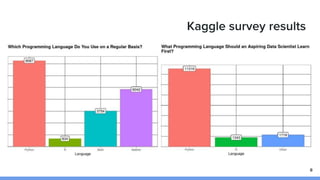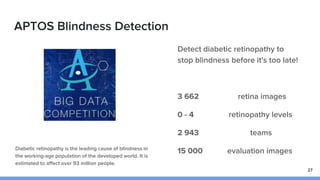How to get into Kaggle? by Philipp Singer and Dmitry Gordeev
- 1. How to get into Kaggle? Philipp Singer & Dmitry Gordeev Vienna Data Science Meetup Vienna, Dec 5th 2019
- 2. Who we are ● Philipp ○ Data scientist at UNIQA ○ PhD in CS at TU Graz ○ Profound experience in ML research and applications ○ Kaggle competition master currently ranked 36th ● Dmitry ○ Data scientist at UNIQA ○ Master’s degree in data mining ○ In-depth experience of ML applications in financial institutes ○ Kaggle competition grandmaster currently ranked 34th ● Competing successfully together on Kaggle for 1 year: The Zoo 2
- 3. What is Kaggle? ● “Your home for Data Science” ○ Online community of data scientists and machine learners ○ Founded in 2010 ○ Acquired by Google in 2017 ● Data science competitions ● Share notebooks, datasets, and discussions ● Courses and tutorials ● Free notebook infrastructure with CPUs and GPUs 3
- 4. How big is Kaggle ● The most popular ML competition platform ● The largest ML community 125 000+ users 350 completed competitions up to 10 000 users per competition Usually 20,000 $ - 100,000 $ prize fund 4
- 9. Competitions on Kaggle ● Usually hosted by companies or research institutes ● Main goal: prediction ● Wide range of different types of competitions ○ Different types of domains (e.g., financial, medical, sports, …) ○ Different types of data (e.g., tabular, nlp, image, videos, time-series, …) ○ Different types of objectives (e.g., classification, regression, segmentation, …) ○ Different goals of competitions (featured, research, playground, in-class) ● Built-in progression system with medals and ranks ● Top spots usually receive prize money 9
- 11. User ranking + titles 11
- 12. How competitions usually work 12https://mc.ai/pseudo-labeling/
- 13. ● Started competing under the team name “The Zoo” exactly one year ago ● Little prior experience on Kaggle ● Participated in 7 competitions ● Strategy: diversify types of competitions for learning purposes The Zoo 13
- 14. Our Journey 14
- 15. Quora Develop models that identify and flag insincere questions. 1 306 122 labelled questions 6.2% insincere questions 4 037 teams 2 hours to fit and predict 15
- 16. Quora - sincere/insincere How can I become a data scientist? How come Trump is so stupid? Is it possible for a vegan who does crossfit to go 10 minutes without telling someone about it? Everytime I slap myself in the face, it hurts. How can I prevent this? 16
- 18. Quora - final standings 18
- 19. Santander 19 Identify which customers will make a specific transaction in the future 200 000 transactions 8 802 teams 2 months duration
- 20. Santander - the mysterious data 20
- 22. Santander - final standings 22
- 23. LANL Earthquake Prediction Predict the time remaining before laboratory earthquakes occur from real-time seismic data. 629 145 480 data points 4 200 trainings segments 4 540 teams 30 minutes to fit and predict 23
- 24. LANL - the physics 24
- 25. LANL - solution ● Derived handful of features from the data capturing peaks and volatility of the acoustic signal ● Combination (ensemble) of two state-of-the-art modeling approaches ○ Gradient Boosting Regression Trees ○ Neural Network (Deep Learning) ● Novel statistical data adjustment to account for different earthquake cycles 25
- 26. LANL - final standings 26
- 27. APTOS Blindness Detection Detect diabetic retinopathy to stop blindness before it's too late! 3 662 retina images 0 - 4 retinopathy levels 2 943 teams 15 000 evaluation images 27 Diabetic retinopathy is the leading cause of blindness in the working-age population of the developed world. It is estimated to affect over 93 million people.
- 29. APTOS - solution ● Careful image pre-processing to remove any kind of bias (e.g., device) ● Combination of several current best deep neural networks ● Models are pre-trained on large collection of image data (imagenet + extra retina images) 29
- 30. APTOS - final standings 30
- 31. Quiz ● Did I have relevant experience to enter this competition? 31 Data: Atomic elements (H for hydrogen, C for carbon etc.) and their X, Y, Z cartesian coordinates. Task: Develop an algorithm that can predict the magnetic interaction between two atoms in a molecule.
- 32. Why should you start on Kaggle? ● Doing is the best way to learn ● Get in touch with data and use cases outside your main domain ● Keep up-to-date with state-of-the-art methods ● Learn from others ● Measure yourself and know where you stand ● Hardware and software is provided by Kaggle 32
- 33. Easy start 33
- 34. How can you start on Kaggle? ● Don’t be afraid! Just do it! ● Overcome self-handicapping behavior ● You gain points regardless of the result ● “Getting started” competitions ● Pick a competition that sounds exciting to you, don’t be afraid to pick one where you have no prior experience ● Research similar previous competitions and read solutions ● Follow published notebooks and discussions 34
- 35. Learn from the community 35
- 36. How to approach a competition? ● Choose a programming language (usually python or R) ● Understand the problem setting, get a feeling for the data and the metric ● Exploratory Data Analysis (EDA) ● Implement basic script / notebook from scratch doing training and prediction OR just fork someone’s model ;-) ● Think hard about robust CV setup ● Keep up-to-date on discussions and developments of competition ● Experiment a lot and iterate quickly 36
- 37. Try more, fail fast 37 Baseline model Final model
- 38. Thanks! Get in touch with us! We are open to any inquiries. me@philippsinger.com dott1718@gmail.com @ph_singer @dott1718 38Vienna Data Science Meetup Vienna, Dec 5th 2019






































